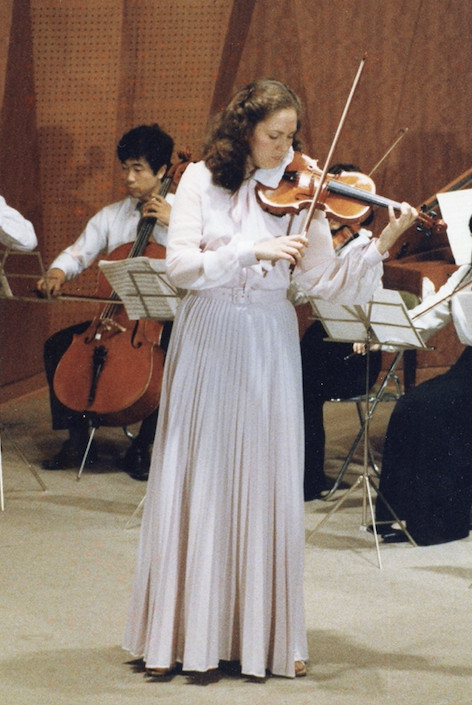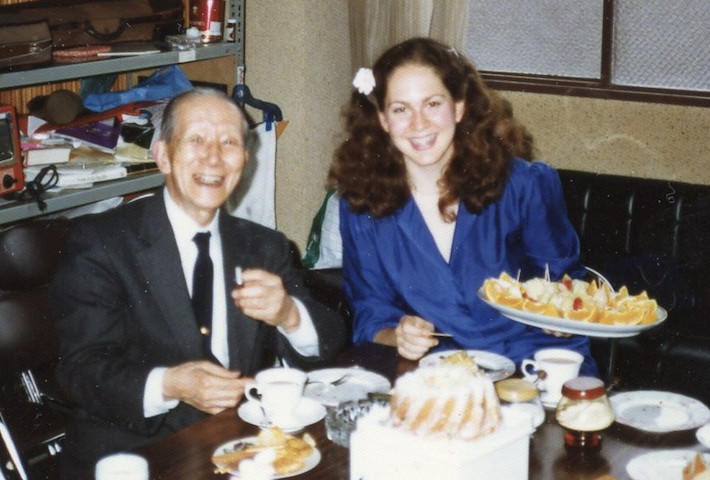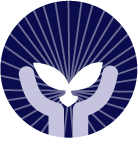Winifred Woodard Crock
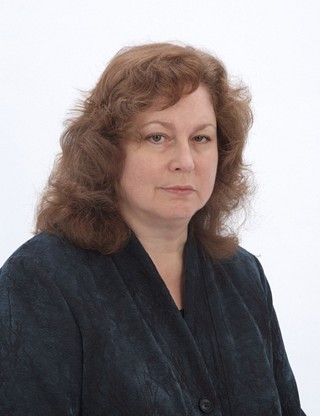
Winifred Crock was the Director of Orchestras at Parkway Central High School for over 25 years and has maintained a private violin studio in suburban St. Louis, Missouri for far longer. In demand as a clinician, pedagogue and conductor, Mrs. Crock has taught and lectured at Midwest, NAFME, ASTA and SAA conferences and has been the featured string clinician at universities and conferences across the country and abroad.
Mrs. Crock holds music degrees from Southern Illinois University at Edwardsville and Kent State University in Ohio. She is a graduate of the Suzuki Talent Education Institute in Matsumoto, Japan under the tutelage of Dr. Shinichi Suzuki. She is a certified Kodály method instructor through Kodály Center of the Americas and a teacher trainer through the Suzuki Association of the Americas. She has worked diligently to develop training programs for teaching Suzuki method in the schools so that more children can have access to Suzuki education.
Mrs. Crock has received numerous teaching awards including the St Louis Symphony Educator of the Year, the NFHA Outstanding Music Educator of Midwest, the Singer Prize, the ASTA Elizabeth Green National School Educator Award, the St. Louis Arts Educator of the Year, and the Missouri ASTA Studio Teacher of the Year and Secondary Teacher of the Year. During her tenure at Parkway Central, the music department was named a “Grammy Gold” school as one of the top ten music departments in the USA. Her publications include numerous articles and books including the Pattern Play for Strings Series and Rhythm Play, Forrester Press, and with Laurie Scott and William Dick, the Learning Together Series, Alfred Music. These three authors were also the recipients of the SAA Community Learning Award.
Mrs. Crock is dedicated to the development and betterment of music education for all children and through this process, helping them to become caring and compassionate human beings. While many of her students have gone on to become music teachers and performers, she believes that some of her most important work is with those who will not pursue a musical career.
Mrs. Crock lives in suburban St Louis, Missouri with her husband, Steve. Their son, William, a violinist, is currently studying at the Norwegian Music Academy in Oslo, Norway.
Instruments studied while in Japan: Violin & Koto
Dates in Japan: 1983-84. Summer of 85 and Summer of 89
Locations of workshops with Dr. Suzuki that were outside of Japan: SAA Suzuki conferences in USA
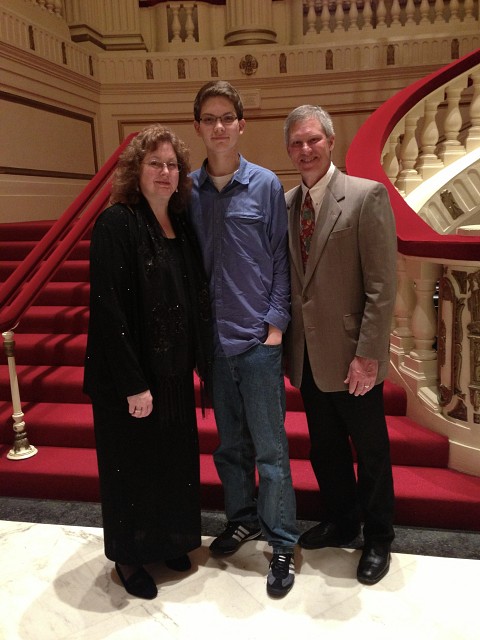

Memories
Lessons from Matsumoto
by Winifred Woodard Crock
Anyone who spent time with Dr. Suzuki has extraordinary tales to tell. He was a brilliant teacher, a wise man, and a caring individual. It was an amazing privilege and incredible gift to be with him and to learn from him. The follow stories are a few of my lessons from Matsumoto.
“I have a new idea!”
Dr. Suzuki lived his philosophy daily. Each morning, he would come to lessons and proclaim, “I have a new idea!” Sometimes the new idea would entail a serious commitment and 10,000 repetitions in practice. Other times he would experiment with us and say, “We need another idea. I’ll have a new one tomorrow.” He always had such joy and excitement in considering new things, and he was always pondering innovative ideas for improvement and learning. His commitment to exploring new ways to teach and learn was one of my most profound lessons from Matsumoto. The Suzuki way was not a static and fixed concept. It was a growing and evolving learning and teaching method!
Delight in New Things
I remember the day new tape players with adjustable pitch were delivered to the school. Dr. Suzuki was delighted with them and showed them off proudly. We used them daily in lessons, group class and recitals thereafter. Another day, Dr. Suzuki and I were discussing repertoire for my graduation recital, and I suggested a Brahms Sonata. He loved Brahms! But he said, “No, Wini. You have too much repertoire already.” I said, “What about the Brahms Sonatensatz?” He replied, “What is that?” I told him of the single Brahms movement and showed him the music the next day. He just laughed and said, “How did I get to be so old and not know about this? How wonderful!” And we added the Sonatensatz to my recital. His desire to learn and grow never diminished and his joy in that process was inspiring.
Words and Deeds
Dr. Suzuki lived his wisdom in his thoughts, words, and deeds. Once in a lesson I was very frustrated as I tried to do a complex new exercise. I would try and he would shake his head and show me again. Finally in frustration I said, “But I know. I know. I know!” Dr. Suzuki stopped. He paused and smiled and said, “Knowledge is not ability.” Thank you for the lesson.
Observing Students
Dr. Suzuki was always observing and watching us. There were two large student rooms where violin students would practice, often, all at the same time. There was little space elsewhere in the school. Dr. Suzuki was constantly stopping by the practice rooms as we practiced, ate lunch, and worked together. Sometimes he would say hello and offer us a box of cookies or other treats. Other times he would just quietly watch us practice and interact with one another. Some days he would comment on our practice or make a suggestion about a technique or way of working. “Wini, practice your shifting this way.” Or, “Wini, what number of practice repetitions are you on?” My answer was, “Sensei, 3469!” “Gambatte!” was the reply. Ten thousand was the goal. Back to practicing. Sometimes, he would comment on something we were doing--“Wini, you chop fruit so well! You will be a great wife some day!” I laughed that day!
Other days he would share things he noticed. One day he walked in and said, “Wini, you are sad today. Your dear friend has gone home! You will see her again. I will give you a special shikishi to remember this day.” I will never understand how he knew how I was feeling, but he did know. I am still so touched by this memory! He would say things like, “I noticed how Joe helps all the new foreigners find a bicycle. That is such a kind thing to do.” Joe would hear about this compliment from others later. Dr. Suzuki was noticing how we were, how we treated others, who we were, and what we were learning.
Dr. Suzuki expected us to play on Monday concert every week. Occasionally, one of us would feel unprepared and would skip the concert thinking he would never notice an absence in the long afternoon concert. He always noticed anyone’s absence, and without fail would say to that person on Tuesday, “I missed hearing you yesterday!” We quickly learned to play every week! Performing every week changed me as a player and as a musician. It was another wonderful lesson.
Everyone can learn
Dr Suzuki’s lessons were intense and specific. He truly taught me the meaning of honest positivity. I felt he was always very encouraging but also completely honest in his response to our playing and to our efforts. If he said you had accomplished something, you knew you had done it just as he wished. Truly honest responses combined with a teacher’s faith in your abilities is one of the most profound gifts that we can give any student.
Dr. Suzuki expected us to learn, memorize, and perform a new piece each week. I thought I learned repertoire quickly, but I was unprepared to learn at this pace. In my first lessons, I played Suzuki repertoire. But when we moved on to new repertoire, I struggled with the expectation of learning, memorizing, and performing a new piece each week. I would play the first part of a piece in my lesson but inevitably break down and need to start over again. He encouraged me, but I felt like such a failure. I kept listening and working to try to learn more efficiently. One week I went to my lesson with a new piece and played it through the first time. Dr. Suzuki rose from his chair and came right up to me and whispered, “I knew you could do it!” and he sat down. This quiet celebration meant the world to me. I was so touched by his faith in me and more importantly, his faith in all of us. He knew we could accomplish the tasks he asked us to do. He absolutely believed in everyone’s capacity to learn and to grow.
Generosity and kindness
Dr. Suzuki loved sweets and he loved to share. He fed us cookies, treats, and chocolates almost daily. Sometimes, I believed there was purpose in his generosity, as he would say, “Practice only on the days you eat! Have a cookie!” We laughed and then we happily accepted his many gifts and kept working. His joy in giving was endless.
A constant source of inspiration
One very memorable lesson Dr. Suzuki said, “Students must be better than the teacher or we will be back to cavemen in a matter of generations.” It was a quote I had read many times, but I realized in that moment, as he looked at each of us with a smile on his face, that he was the teacher, and we were the students of whom he was speaking. This was his expectation for us, and this was his challenge to us as we went forward with our lives. We had to strive to be better than our teachers. This lesson will inspire me always. There will never be another Dr. Suzuki, but I will always strive to grow and learn as a teacher and as a human being because of his example.
Thank you, Sensei! Mainichi domo arigato gozaimashita!
Photos in Matsumoto
Graduation and Concert Party, 1984
